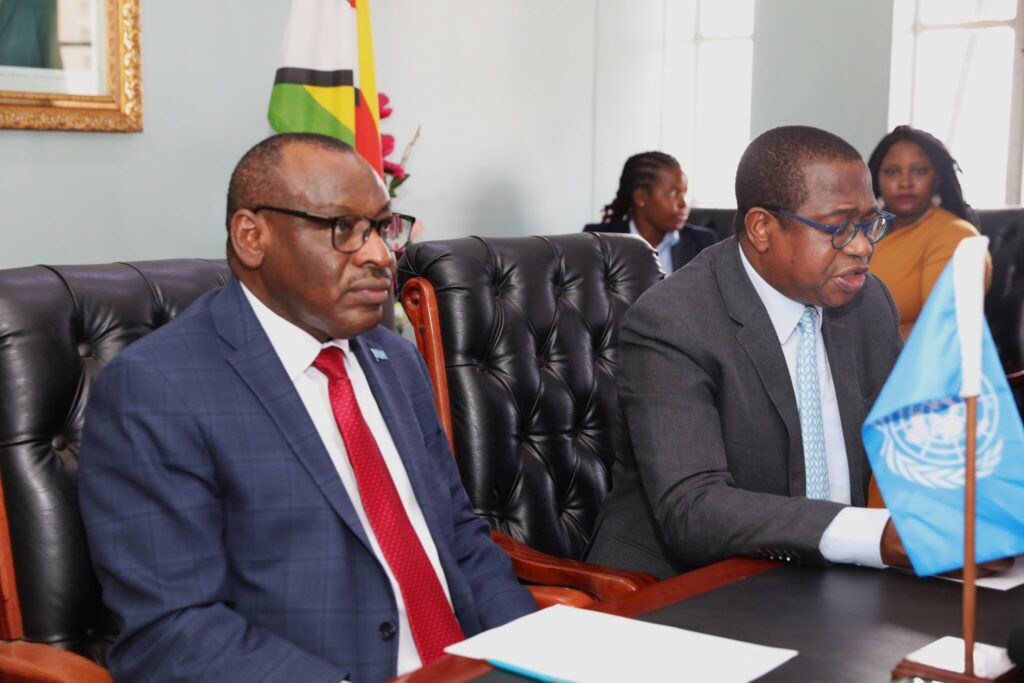Dar es Salaam. In a momentous occasion, Mr Claver Gatete, the UN Under-Secretary-General and Executive Secretary of the Economic Commission for Africa (ECA), held his introductory press conference on Monday, February 12, 2024 about the upcoming conference.
Alongside him was the Minister of Finance of Zimbabwe, Mthuli Ncube, marking the commencement of preparations for the ECA Conference of Ministers of Finance, Planning, and Economic Development (COM2024) in a hybrid meeting organized by UN- ECA.
Set against the awe-inspiring backdrop of Victoria Falls in Zimbabwe, the conference, scheduled from February 28 to March 5, 2024, the ECA Executive Secretary note that “ the event theme is: Financing the transition to inclusive green economies in Africa: imperatives, opportunities, and policy options.”
According to him the goal is to tackle critical issues such as climate financing, technological advancement, and the reform of the international financial architecture.
Mr Gatete outlined the conference structure, starting with technical discussions on historical issues, followed by site meetings and ministerial sessions, all revolving around the theme. The overarching objective is to refocus Africa’s priorities in light of challenges like climate change, technological disparities, and economic development.
One significant highlight is the discussion on the reform of the international financial architecture. Finance ministers, as the foot soldiers on the ground, are expected to play a pivotal role in influencing decisions for a fairer financial system.
Mr Gatete pointed that “The talks will extend to financing development, climate finance, and exploring solutions to the challenges faced by countries. The reform of the international financial architecture is going to be discussed, and that’s why the meeting of the ministers is really taking place.”
Minister Ncube highlighted the unique choice of Victoria Falls for the conference, not just for intellectual discussions but also for its tourism potential, offering a distinctive experience for participants.
“It is the only city in the world located in the game. So basically, there are multiple rights displays. So if you come across an elephant, it is blocking the road. Just leave it alone” said Minister Ncube.
During the question and answer session, the focus turned to the specific reforms advocated for by the ECA and African ministers. Mr Gatete emphasized the historical dependency of developing countries, especially African nations, on international financial institutions.
Mr Gatete noted that “Usually developing countries, including almost all the African countries, are the countries that were dependent on the cheap money, the resources which are positioned on the international financial institutions. Among the discussion is on how we are going to move from there”
Minister Ncube provided additional insights into the reforms, emphasizing governance issues within international financial institutions. He noted the progress made but stressed the need for more efforts.
“The first one is an issue about the governance of our international financial institutions. But also, we celebrate the progress so far in responding to that issue” he said Minister Ncube.
The discussion explored the complexities of global financial architecture, focusing on finding innovative solutions. The importance of domestic resource mobilization, taxation reforms, and capital market development were highlighted.
On that Mr Gatete commented that “The domestic resource mobilization, what can we do on the taxation, especially with that in terms of the reform of our taxation system? What can we do in terms of capital market development, because there’s no country that drops without the capital market?”
Minister Ncube stressed the significance of beneficiation, advocating for African countries to stop allowing raw mineral exports without value addition.
“We have now said that look, no lithium should be exported without beneficiation, even by law, minor beneficiary to the level of lithium allogenic is going up towards the battery manufacturers” added the Minister.
The discussion also touched on the role of carbon markets in raising additional climate finance. Mr Gatete suggested the need for advice and collaboration among African countries to navigate this complex landscape.
Mr Gatete noted that “Countries here need advice? You need advice, and we’re very happy to share Madagascar on how to set up the domestic framework for regulating these carbon credit markets.”
As the conference progresses, it promises to be a platform for crucial discussions on reshaping Africa’s economic future. While the specific outcomes are yet to be determined, the insights shared by Mr Gatete and Minister Ncube indicate a commitment to finding comprehensive solutions that address the unique challenges faced by the continent.
The ECA Conference of Ministers holds the potential to chart a course towards a more sustainable, inclusive, and resilient African economy.



cheap facebook accounts account buying platform marketplace for ready-made accounts